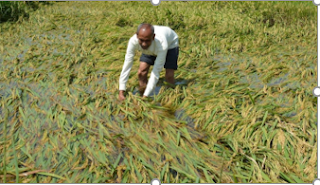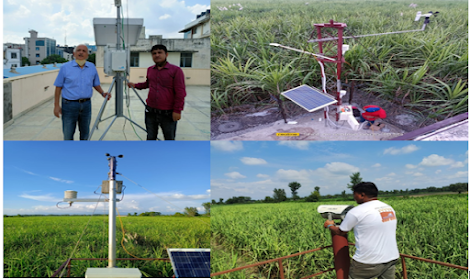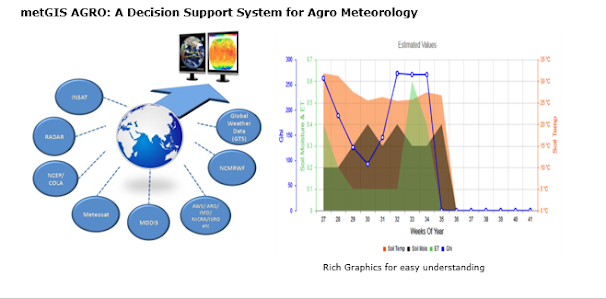TECHNOLOGY IS ONLY
SAVIOUR FOR FARMERS FROM CLIAMTE CHANGE CHALLENGES
Climate change is
of ultimate concern to economists, ecologists, and agriculturalists as
agriculture and
climate change closely relate. While farmers have to amend
their practices suffering from weather changes,the impact of modern
agriculture on climate change cannot be denied. Thus, the connection between
industrial agriculture and climate change demands keen attention as the influence
is far from beneficial.
The accelerating
pace of climate change, combined with global population and income growth,
threatens food security and agriculture everywhere. Agriculture is extremely
vulnerable to climate change. Higher temperatures eventually reduce yields of
desirable crops while encouraging weed and pest proliferation. Pest’s
management become less effective, heat waves can cause extreme heat stress in
crops, which can limit yields.
If we look at 2021 monsoon, we witnessed erratic and extreme rainfall
events. July & August were unusually dry threatening early stages of crop
growth followed by unusually wet September causing flash floods in many areas
causing widespread damage to standing crops. Intra monsoon precipitation
variations caused by climate change is here to stay and will continue to cause
disruptions in Indian agriculture.
On the other hand, there has been proliferation of technologies in agriculture with new high yielding, specially bred crop verities requiring precision farming with some very high degree of attention in the cultivation practices. Precision farming is variety-specific, site-specific soil specific as well as weather specific farm management concept that uses information technology to ensure optimum health and productivity of crops. It incorporates a broad range of technologies such as bioengineering, robotics and automation, imagery and sensors, and big data etc. Farmers are required to be ever alert to adapt quickly to the changing conditions of weather and climate.

Since June this year, Maharashtra has received
1,129.3 mm of rainfall, significantly above the average of 1,036.3 mm it
usually receives in this period. This has created havoc in 10 districts in the
state’s western and northeastern regions. As of this time, about 1.23 lakh
hectares of kharif crop have been destroyed. The damage to crops amounts to
about one per cent of the state’s total kharif crop, planted on about 141.98
lakh hectares.In the current scenario, India’s agriculture is extremely
vulnerable to climate change. Country needs crop diversification, productive
water usage, development of extreme weather resistance crops and development in
precision farming techniques.
BKC’s in-house instrumentation for precision
farming as well as a weather-based decision support system that can
auto-generate advisories and customizable bulletins.


- metGIS is a measure tool that display the AWS data (Temp, RH, Wind, Pressure, Cloud cover or sunshine, radiation, ET, Soil Moisture, Soil Temp, etc.), NWP models, satellite images together or separately in layers in WMO defined formats.
- Crop Calendars and an interface and library of algorithms for crop and disease forecasting.
In India there is additional challenge of small holdings and highly fragmented agriculture.
Fortunately, technologies now exist to address the new challenges in precision farming to make farming weather resilient irrespective of the farm size or the crop diversities.
BKC WeatherSys Pvt Ltd, a well-established Weather Company in India, which recently incubated BKC Aggregators. WeatherSys were system admin for NASA in India for 06 years Indo - US Satellite Data Exchange Programme between two Governments.
BKC India's first private sector meteorology and environmental technology company, have over 30 years of experience in meteorological measurements and forecasting. Our Solar Weather Monitoring Stations are operational across over 250 sites in India.
Established 140 Digital Meteorological Data Dissemination and Analysis (DMDD-LRIT/HRIT) in real time as per WMO standard for India Met Department, Indian Air Force, DRDO and Indian Navy and neighboring countries.
Installed and commissioned hundreds of weather monitoring stations across India.
BKC Aggregators have been working as a technical partner to LT Foods, TCS, SARENS, IFFCO KISAN, BAIF, NAGA LTD, ONGC, IMD, and IAF, DRDO for numerous years in providing actionable granulated weather forecast for various on shore and off shore stations in India.



Your post is really impressive and it has lots of knowledge in learning about best fertilizer manufacturer in India.keep share your valuable knowledge with us.
ReplyDelete